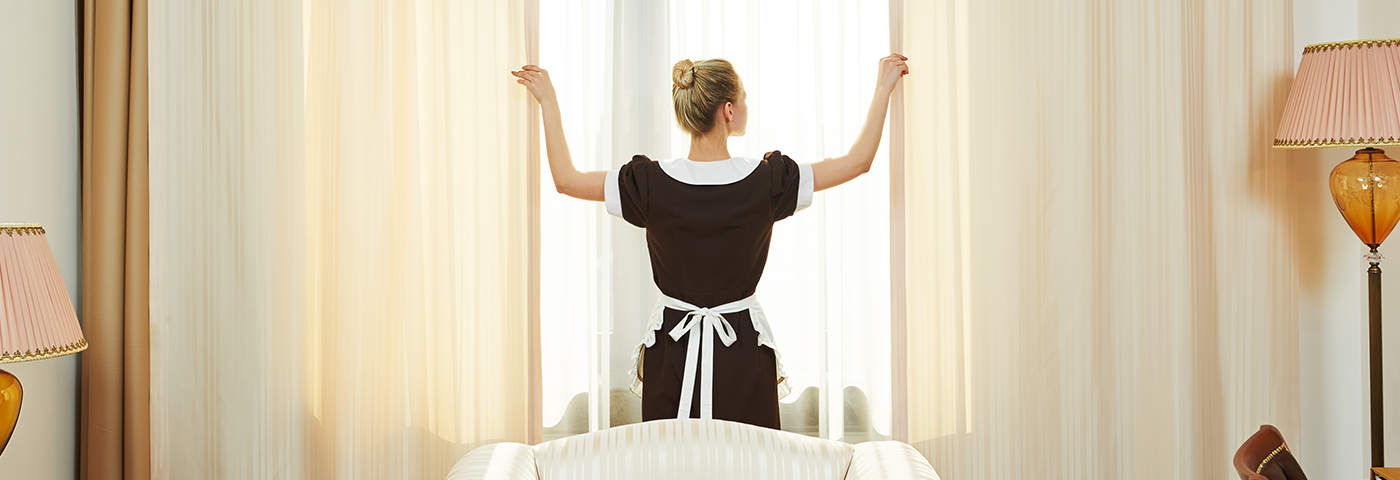A report released last week into the working conditions of hundreds of thousands of women cleaning bedrooms and other hotel areas across the world. Published by Oxfam Canada, Tourism’s Dirty Secret examines the daily lives of housekeepers in Toronto, Canada, Punta Cana, Dominican Republic and Phuket, Thailand. It finds that: “The women who make hotel beds and clean hotel toilets labour long hours for meagre pay, face sexual harassment and intimidation, are exposed daily to toxic chemicals and live in fear of arbitrary dismissal.”
The report reveals how, in order to stay competitive, hotels are using fewer hotel housekeepers to do more strenuous work. These housekeepers are paid according to the number of rooms they clean. In Toronto, the average is between 10 and 17 rooms a day. In Phuket and Punta Cana, the average is higher still, with one housekeeper reporting that she cleans between 16 and 20 rooms daily and has to refresh an additional 90 rooms in the evening.
The pace and nature of the work is exhausting, with both the physical exertion and constant exposure to potentially toxic cleaning chemicals putting women’s health at risk. According to David Sanders, Organizing Director for Unite in Toronto, “The injury rate for room attendants in North America’s hotel industry is bigger than that in the meatpacking industry.” Meanwhile research in Sweden earlier this year found that out of 50 groups of female workers, hotel housekeepers are at the top of the list as regard injuries affecting the speed of upper arm movement, the greatest amount of bending forward of the back and the greatest strain on the lower arm.
Furthermore, a survey of 500 Chicago housekeepers by the union revealed that 58 per cent of housekeepers had been sexually harassed by guests. Finally, because their daily work is so long, exhausting and poorly remunerated, housekeepers also struggle to find adequate care for their children, a situation exacerbated for the many migrant women working as housekeepers who live far from their family support networks.
So what can be done? According to the report, the city of Seattle now requires hotels to provide panic buttons and post signs in hotel rooms denouncing harassment and informing guests of the buttons. Likewise this month, Chicago City Council passed the so-called “Hands Off, Pants On” Ordinance requiring Chicago hotel employers to provide all housekeepers and restroom workers who work alone with mobile notification devices or “panic buttons”. These summon hotel security or management to the employee’s location when he or she “reasonably believes that an ongoing crime, sexual harassment, sexual assault or other emergency is occurring in the employee’s presence.” Earlier this month in the UK, following the Global Hotel Housekeepers Week campaign (October 9 to 14), WGC, a UK supplier of hospitality and housekeeping services, said it would end zero hours contracts from November 1.
Oxfam is now publishing an online FairHotel Guide and app of socially responsible hotels, and a list of those currently on its boycott list. As well as the US FairHotels site, there are similar sites for hotels in Ireland, Slovenia, Sweden, Norway, Denmark and Croatia. There is also an Oxfam campaign site at shortchanged.ca where people can sign up to express their support and keep the issue in the public eye. The growth in such moves to raise awareness – echoing the current focus on challenging sexual harassment at work – suggest that ever increasing transparency can, and must, shine an unwanted spotlight on those companies that continue profit while putting women’s welfare and safety at risk.
A couple of weeks ago the International Tourism Partnership announced the launch of its Vision 2030 goals, whereby its members, representing many of the biggest hotel groups in the world, have committed to focus on four of the UN Sustainable Development Goals. Two of these are particularly relevant to this issue, as they are Human Rights and Youth Employment. According to ITP’s statement on human rights: “Labour rights issues – decent hours, contracts and pay – are global human rights. Where the law is insufficient to protect workers’ rights, the United Nations Guiding Principles put the onus on the business to protect them.”
If the industry needs an SDG to justify fair work for half the world’s population, it can choose between Goal 1 (End Poverty), Goal 3 (Good Health and Wellbeing), Goal 5 (Gender Equality), Goal 8 (Decent Work and Economic Growth), Goal 10 (Reduce Inequalities) or Goal 12 (Responsible Consumption and Production). Because it’s one thing to claim tourism supports 1 in 11 of all jobs worldwide. It’s another to ensure those jobs are actually worth doing.

